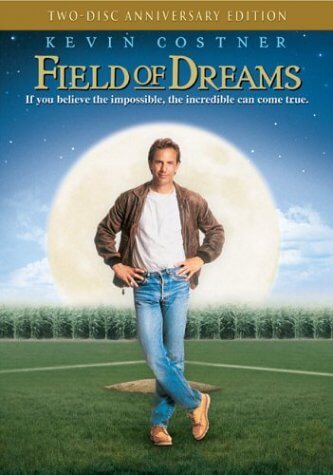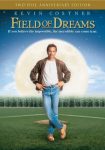![]()
“If you build it, he will come” and “he” is Shoeless Joe Jackson…
Most Arabs have no connection to “America’s pastime” but two Arab Americans have played in the major leagues and every Arab can relate to the injustice done unto Shoeless Joe Jackson.
Lebanese American Joseph Michael Lahoud was born in 1947 and he played eleven seasons of Major League Baseball as an outfielder and designated hitter.
In 1963, Sam Khalifa was born in California and lived in Egypt and Libya while his father worked as a government consultant to the respective governments before settling in Arizona. Khalifa played 164 games over three seasons with the Pittsburgh Pirates before retiring following his father’s death. His Egyptian father, a heterodox Muslim scholar was murdered in 1990 by an Islamic extremist opposed to his teachings.

“If you build it, he will come” is the ethereal refrain from the film Field of Dreams, based on the novel Shoeless Joe by W. P. Kinsella.
Kevin Costner played Ray Kinsella, the Iowa farmer who heeds “If you build it, he will come” by erecting a baseball diamond in the center of his cornfield.
“He” first appears to be the ghost of Shoeless Joe Jackson played by Ray Liotta.
Liotta bats right and throws left; but Shoeless Joe batted left and threw right.
Ray Kinsella and Shoeless Joe play a few games and as the weeks go by, Ray receives other messages from the disembodied voice, such as “Ease his pain.”
Ray understands his corn ballfield is holy ground divinely ordained to give a second chance to a few people whose lives were unjustly and irrevocably altered because men played God!
The corn field in Dyersville, Iowa continues to draw thousands of tourists each year since the release of Field of Dreams in 1989.
A century ago Shoeless Joe Jackson was a baseball star unjustly disgraced for allegedly throwing the 1919 World Series.
My life’s work has been writing about injustices in hope to rectify them -such as ending the nearly 50 years of USA Government Cover-Up of Israel’s 8 June 1967 attack on the USS Liberty and the over 12 year human rights struggle of Mordechai Vanunu, Israel’s nuclear whistle blower:
But now Shoeless Joe has captured my attention due to W.P. Kinsella’s Shoeless Joe.
Kinsella published nearly 30 books of fiction, non-fiction and poetry before his assisted death on 16 September 2016 in Hope, B.C.
In 1993 Kinsella was named to the Order of Canada and the citation stated:
He has attained international stature as an author of stories about people who pursue their dreams, despite the failures and foibles they must struggle to overcome adding that “if you build it, he will come” – had become part of North American culture.
Kinsella was a member of the American Atheists organization.
Kinsella may not have believed in God but this writer believes God is using Kinsella to reach people on a deeply spiritual level to help rectify the injustice done unto Shoeless Joe by Judge Kenesaw Mountain Landis.
According to The University of Minnesota:
Spirituality is a broad concept with room for many perspectives. In general, it includes a sense of connection to something bigger than ourselves, and it typically involves a search for meaning in life. As such, it is a universal human experience—something that touches us all. People may describe a spiritual experience as sacred or transcendent or simply a deep sense of aliveness and interconnectedness…. Like your sense of purpose, your personal definition of spirituality may change throughout your life, adapting to your own experiences and relationships. [1]
In 2001, W.P. Kinsella wrote for The Globe and Mail:
If you go to Cooperstown, you’ll read about Shoeless Joe, his flawless fielding, his scalding batting average, even his great performance in the 1919 World Series, the series he allegedly help throw; if you visit the Hall of Fame’s website you can see his glove. That he’s not among the 187 former players whose bronze plaques hang in the Hall is wrong. What more can I say? [2]
Jackson was the oldest son of a sharecropper and grew up on the outskirts of Greenville, South Carolina.
When Jackson was 6 or 7 years old he began to work 12-hour shifts in one of the town’s textile mills and thus Jackson was under-educated and illiterate. When he was 10 he nearly died from the measles, which paralyzed him for two months.
When he was 13 years old, Joe started to play for the Brandon Mill’s baseball team.
Jackson began his professional career in baseball with the Carolina Association’s Greenville Spinners in 1908 and married his long-time sweetheart Katie Wynn.
In his first season as a professional ball player, the 19-year-old Jackson batted .350 and became known as Shoeless Joe.
Jackson explained that after his feet blistered from a new pair of cleats and his old shoes hurt, he played in his socks. After hitting a triple in the seventh inning and while running to third base a fan yelled, “You shoeless sonofagun you!”
Joe never played in his socks again, but he was called Shoeless Joe for the rest of his life.
After one season with the Spinners, the Philadelphia Athletics bought his contract for $325.
Jackson was traded to Cleveland in 1911 where he played his first full season and compiled a .408 batting average, a record that still stands for rookie seasons.
In August of 1915 Jackson was traded to the Chicago White Sox.
In 1917 Jackson and the White Sox won the World Series. During the series Jackson batted .307 and led the White Sox to victory over the New York Giants.
Jackson missed most of the 1918 season due to World War I and his working in a shipyard.
In 1919, he returned to post a .351 average during the regular season and .375 with perfect fielding in the World Series.
However, the heavily favored White Sox lost the World Series to the Cincinnati Reds.
Soon after, Shoeless Joe was suspended from playing baseball along with seven other members of the White Sox; after allegations surfaced that the team had thrown the 1919 World Series.
The eight White Sox players were accused of accepting $5,000 each to throw the Series.
In September 1920, a grand jury was convened to investigate the allegations.
In 1921, a Chicago jury acquitted Jackson and his seven teammates of wrongdoing.
However, Judge Kenesaw Mountain Landis, the newly appointed Commissioner of Baseball, imposed a lifetime ban on all eight players!
Shoeless Joe Jackson died still proclaiming his innocence and recent evidence has surfaced backing him up.
Jackson “refused the $5,000 bribe on two separate occasions—despite the fact that it would effectively double his salary—only to have teammate Lefty Williams toss the cash on the floor of his hotel room. Jackson then reportedly tried to tell White Sox owner Charles Comiskey about the fix, but Comiskey refused to meet with him.” [3]
Charles Comiskey was widely disliked by his underpaid ballplayers who resented his miserliness. Because of baseball’s reserve clause, any player who refused to accept a contract was prohibited from playing baseball on any other professional team. Because of the clause, players were prevented from changing teams without permission from their team, and in the days before unions the players had no bargaining power. In the era of the reserve clause, gamblers preyed on ballplayers needing extra cash.
Unable to afford legal counsel, Shoeless Joe was represented by the team attorney -a blatantly clear conflict of interest!
Before Jackson’s grand jury testimony, the attorney got Joe drunk and was also able to persuade the nearly illiterate Jackson to sign a waiver of immunity from prosecution!
“Years later, the other seven players implicated in the scandal confirmed that Jackson was never at any of the meetings. Williams said that they only mentioned Jackson’s name to give their plot more credibility.” [Ibid]
A 1993 article in The American Statistician reported the results of a statistical analysis of Jackson’s contribution during the 1919 World Series, and concluded that there was “substantial support to Jackson’s subsequent claims of innocence”. [Ibid]
Long before the 1919 World Series scandal broke, many baseball owners had nursed longstanding grievances with the way the game was being governed by the National Commission.
The World Series scandal gave owners the impetus to make major changes in the governance of baseball. The owners’ originally sought to appoint the federal judge and noted baseball fan Kenesaw Mountain Landis to only head a reformed National Commission.
However, Landis demanded to be named the game’s sole Commissioner, and even then only on the condition that he be granted essentially unchecked power over the sport!
The owners agreed.
Judge Landis thus became the first Commissioner of Baseball and was granted unlimited authority over every person in both the major and minor leagues.
Among Landis’ first acts as Commissioner was to use the unprecedented powers and he placed the eight accused White Sox players on an “ineligible list,” which suspended them from playing professional baseball. On 3 August 1921, the day after a federal court acquitted the players, Judge Landis issued his own verdict:
Regardless of the verdict of juries, no player who throws a ball game, no player who undertakes or promises to throw a ball game, no player who sits in confidence with a bunch of crooked ballplayers and gamblers, where the ways and means of throwing a game are discussed and does not promptly tell his club about it, will ever play professional baseball. [4]
Landis claimed that although the players had been acquitted in a court of law, he believed they had broken the rules of baseball, and so none could ever be allowed back in the game if it were to regain the trust of the public.
Landis essentially decreed that the Commissioner of Baseball is the highest and final authority —over organized professional baseball in the United States.
Landis also established the precedent that the Commissioner of Baseball was invested by the league with Plenary power and the responsibility to determine the fitness or suitability of anyone, anything, or any circumstance, to be associated with professional baseball, past, present, and future!
May God have mercy on such arrogant chutzpah!
The Shoeless Joe Jackson Museum opened in 2008, across from Fluor Field in Greenville S. C.’s West End. The nonprofit organization is staffed with volunteers seeking to end the injustice done unto Shoeless Joe.
This reporter has joined that cause and as always seeks to set the record straight on erroneous legends.
One story goes that when Shoeless Joe was departing the criminal court building after giving his testimony several hundred 6 to 16 year olds crowded around him.
One stepped up and grabbed his coat sleeve pleading, “Say it ain’t so, Joe.”
Allegedly Jackson replied, “Yes, kid, I’m afraid it is.”
It wasn’t so!
In a 1950’s interview in SPORT Magazine Jackson confirmed that the legendary exchange never occurred.
Jackson remains on Major League Baseball’s ineligible list, which automatically precludes his election to the National Baseball Hall of Fame.
In 1998, Hall of Famer Ted Williams filed a petition with Baseball Commissioner Bud Selig asking him to clear Jackson’s name.
In 1999, the U.S. House of Representatives passed a resolution lauding Jackson’s sporting achievements and encouraging Major League Baseball to rescind his ineligibility.
Commissioner Bud Selig stated at the time that Jackson’s case was under review, but no decision was issued during Selig’s tenure- or since!
In 2015, the Shoeless Joe Jackson Museum formally petitioned Commissioner Rob Manfred for reinstatement, on grounds that Jackson had “more than served his sentence” in the 95 years since his banishment by Landis.
Commissioner Manfred denied the request after an official review.
In 1951 Shoeless Joe died at the age of 64 in Greenville S.C. He and his wife operated “Joe Jackson’s Liquor Store”, until his death.
A legendary true story of Jackson’s post-major league life took place in that liquor store.
One day Ty Cobb came into the store but Jackson showed no sign of recognition. After Cobb made his purchase, he asked, “Don’t you know me, Joe?”
Jackson replied, “Sure, I know you, Ty, but I wasn’t sure you wanted to know me. A lot of them don’t.” [Ibid]
Ty Cobb also said, “Shoeless Joe was the finest natural hitter in the history of the game.”
Another inspiring quote from Shoeless Joe is a line the J.D. Salinger character says to farmer Ray Kinsella:
If I had my life to live over again, I’d take more chances. I’d want more passion in my life. Less fear and more passion, more risk. Even if you fail…
This Story will continue HERE
- http://www.takingcharge.csh.umn.edu/enhance-your-wellbeing/purpose/spirituality/what-spirituality
- http://www.theglobeandmail.com/arts/books-and-media/shoeless-joe-author-wp-kinsella-saw-baseball-as-a-metaphor-for-life/article31976784/
- https://en.wikipedia.org/wiki/Shoeless_Joe_Jackson
- http://www.espn.com/classic/s/black_sox_moments.html
Other Sources:
http://www.shoelessjoejackson.com/about/biography.html
- Vanunu still has more nuclear secrets to spill, Israeli court declares - December 29, 2021
- 9/11 and a 20th Reflection of That Day - September 5, 2021
- Mordechai Vanunu: Final Annual Update and this Writers Next Steps - June 19, 2021

























